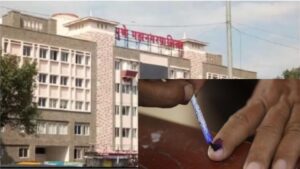₹160 Crore Private Haj Quota Crisis: Over 2,000 Pune Pilgrims Stranded After 2025 Cancellation, Demand Refunds and Govt Probe

₹160 Crore Private Haj Quota Crisis: Over 2,000 Pune Pilgrims Stranded After 2025 Cancellation, Demand Refunds and Govt Probe
Pune, July 24, 2025: A major crisis has erupted in the private Hajj travel sector, leaving over 2,000 pilgrims from Pune stranded following the sudden cancellation of the 42,000-pilgrim quota earlier allotted to India’s private Hajj tour operators—Certified Haj Group Organisers (CHGOs) and Hajj Group Organisers (HGOs)—by Saudi Arabia. The abrupt move has upended the spiritual aspirations of thousands of Muslims who had entrusted their life savings, with each person contributing between ₹8 to ₹10 lakh for the sacred journey.
According to local Haj committee members and travel coordinators, the total amount collected from these Pune-based pilgrims exceeds ₹160 crore. Most of the affected individuals are now facing serious financial distress, with no confirmation of refunds or guidance from the tour operators handling their bookings.
Lack of Transparency and Accountability
Despite repeated appeals, formal complaints, and mounting public pressure, many private Haj tour companies have remained unresponsive. Pilgrims report that neither are refunds being initiated nor are there any assurances being offered. Families who poured in their lifetime earnings for Haj 2025 now feel deceived and helpless due to the lack of any structured resolution.
Jaymala Dhankikar, a Pune-based civic rights campaigner, voiced concern over the inaction. “We’ve received dozens of complaints where there’s zero communication from the tour operators. This isn’t just about money—these are people’s life savings. When someone pays ₹8 to ₹10 lakh for a promised pilgrimage experience, they deserve honesty, transparency, and answers,” she said.
Dhankikar has raised the issue with the Ministry of Minority Affairs, the Maharashtra Haj Committee, and the Director General of Police. She has also called for an investigation by the Central Bureau of Investigation (CBI), describing the current functioning of the private quota system as “unregulated and shrouded in secrecy.”
Breach of Trust and Community Discontent
What began as a logistical issue has now snowballed into a broader debate about trust and governance. The financial uncertainty has been compounded by a noticeable silence from both central and state authorities. Neither the Ministry of Minority Affairs nor the Maharashtra State Haj Committee has issued an official statement, despite growing outrage.
“Dishonest intentions and profiteering are clearly visible in the conduct of these private Haj operators. The private quota was cut because they failed to meet the Saudi deadline yet they continue to hold on to large sums collected from pilgrims. Since Muslims are not permitted to earn interest, this unutilized money sitting with profit-driven operators raises serious ethical and legal concerns. These are not charitable entities but they are commercial businesses. The government must cancel their licenses, prosecute them for public cheating, and lodge FIRs wherever refunds are not issued. It’s time to bring these operators firmly under the ambit of the law,” said the former Chief Commissioner of Income Tax Akramul Jabbar Khan, who has offered pro bono legal support to initiate action against the errant tour operators in Pune.
Saleem Mulla, President of the Maharashtra Wakf Liberation and Protection Taskforce, has termed the situation a betrayal of trust. “This is not just about going for Haj. It’s about restoring the confidence of thousands who feel let down. The government must step in immediately and ensure the system is made accountable,” he said.
Mulla has demanded that a dedicated task force be appointed by the government to conduct a detailed inquiry into the matter. He suggested convening a joint meeting with all private Hajj operators in Pune, establishing fixed refund timelines, and initiating reforms to ensure transparency in the allotment of the private Haj quota.
2025 Crisis Spills Into 2026 Haj Preparations
The issue is further intensifying as the registration process for the 2026 Hajj pilgrimage via the Central Haj Committee is already in progress, with the deadline fast approaching on July 31, 2025. For many who were affected this year, the thought of reapplying under the private quota system is filled with apprehension and mistrust.
“How can we consider applying again when we haven’t even seen a rupee back from the previous trip?” questioned a disillusioned pilgrim from Kondhwa, who had paid ₹8.5 lakh earlier this year and has received no communication since.
Pilgrim and Civil Society Demands:
- Immediate Refund Timelines: A clear and official response from tour operators outlining when and how refunds will be processed.
- Independent Government Task Force: To investigate the cancellation, audit financial transactions, and evaluate operator conduct.
- Quota System Overhaul: Full public disclosure of how private Hajj quotas are allocated and monitored.
- Official Statement: From the Ministry of Minority Affairs and Maharashtra Haj Committee addressing the scale and seriousness of the issue.
- Legal Action: FIRs and financial probes into any suspected misappropriation or negligence by tour operators.
Urgent Need For Action
With over ₹160 crore in question and thousands of affected families waiting for justice, religious leaders, civil society groups, and concerned citizens are calling this more than just a financial mishap—it’s a moral and spiritual failure. Many believe the handling of this crisis will shape public perception of private Hajj travel for years to come.
“The government’s silence is deafening. The pain of thousands can no longer be brushed aside. If the Ministry of Minority Affairs doesn’t take swift and decisive action, it risks losing the faith of an entire community,” warned activist Dhankikar.
As the Hajj 2026 cycle gathers pace, stakeholders say it’s imperative that regulatory reforms, accountability, and timely justice become top priorities to prevent a repeat of this crisis.









